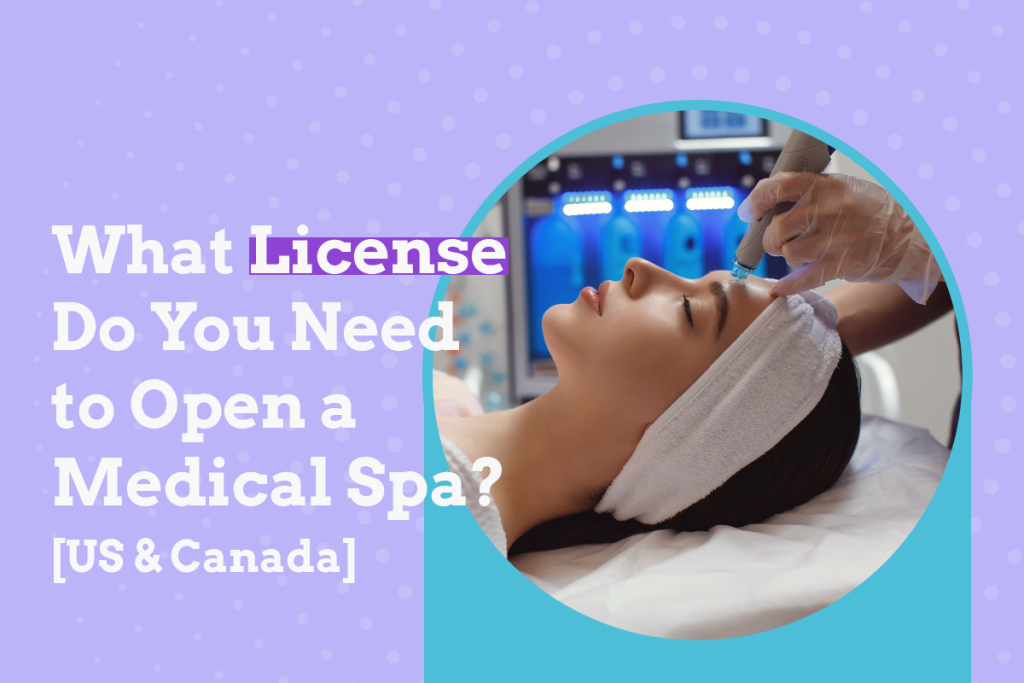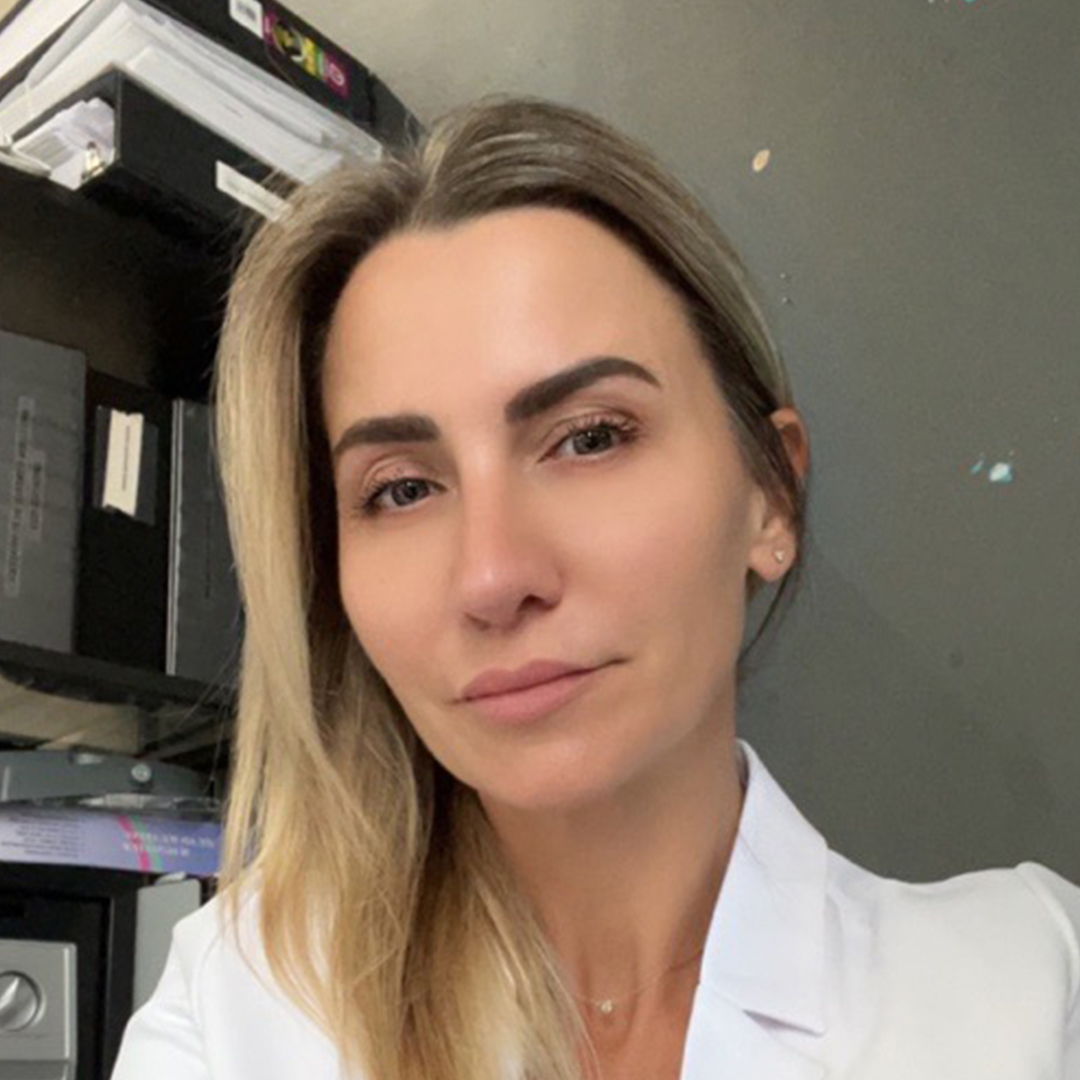What License Do You Need to Open a Medical Spa? [US & Canada]

By Luciana Dabit
The medical spa industry is one of the fastest growing on the planet. Globally, this industry is predicted to reach $49.4 billion USD by 2030, growing at a rate of 15.13%—that’s three times the healthy benchmark of 5%.
Now’s the perfect time to capitalize on that growth by opening your own medical spa.
In this guide, we dive into the more complicated part of the process: licensing.
What license do you need to open a medical spa? Keep scrolling for info on the required licenses and be sure to also check out our guide to starting a medical spa for strategic guidance.
What’s in this guide:
- Required medical spa licenses in Canada
- Required medical spa licenses in the United States
- Other licenses, requirements, and recommendations for opening a medical spa
Required medical spa licenses in Canada
What license do you need to open a medical spa in Canada?
In Canada, the licensing requirements are fairly straightforward. Anyone can open a medical spa in Canada so long as they have registered physicians, nurses, and accredited medical practitioners to execute treatments. As a business owner, you are not required to have any sort of professional medical license to operate a medical spa.
You just need to pay attention to which professionals can provide which services.
Physicians, being fully licensed medical doctors, have the broadest scope of practice. They can perform a wide range of medical procedures, including injectables (e.g., Botox, dermal fillers), laser treatments, minor surgical procedures, and other advanced aesthetic treatments. They can also diagnose medical conditions and prescribe medications like Tretinoin and Adapalene.
Nurses can perform various non-surgical aesthetic procedures like administering injectables, performing laser treatments, microneedling, and other skin care treatments. Nurse Practitioners have a broader scope and can prescribe medications.
Depending on their accreditation, medical aestheticians and other specialized healthcare providers can offer non-invasive procedures like facials, chemical peels, microdermabrasion, and certain laser treatments.
Required medical spa licenses in the United States
What license do you need to open a medical spa in the US?
In the United States, medical spas are treated as medical practices. Because medical spas offer services that involve medical procedures, they are regulated similarly to other medical practices. Different states have different laws about who can own a medical practice (or medical spa).
In some states, only licensed medical professionals (like doctors) are allowed to own medical practices, including medical spas. This means the business must be set up in a way that complies with specific laws designed for medical professionals, like a Professional Corporation (PC) or Professional Limited Liability Company (PLLC).
In other states, non-medical professionals can own a medical spa. This means the business can be set up as a Limited Liability Company (LLC) or a regular corporation, which are more general types of business entities.
Opening requirements by US state
Here’s a quick overview of requirements by state. Be sure to check your local laws for more details.
- Alabama: Owners must be state-licensed physicians.
- Alaska: Owners do not need to be physicians but must employ licensed professionals to perform services.
- Arizona: Owners do not need to be physicians but must employ licensed professionals to perform services.
- Arkansas: Owners must be state-licensed physicians or NPs.
- California: Owners must be state-licensed physicians or NPs. RNs can own a 49% share.
- Colorado: Owners must be state-licensed physicians or NPs.
- Connecticut: Owners do not need to be physicians but must employ licensed professionals to perform services.
- Delaware: Owners do not need to be physicians but must employ licensed professionals to perform services.
- Florida: Owners do not need to be physicians but must employ licensed professionals to perform services.
- Georgia: Owners must be state-licensed physicians.
- Hawaii: Owners do not need to be physicians but must employ licensed professionals to perform services.
- Idaho: Owners must be state-licensed physicians or NPs.
- Illinois: Owners must be state-licensed physicians or NPs.
- Indiana: Owners must be licensed healthcare professionals.
- Iowa: Owners do not need to be physicians but must employ licensed professionals to perform services.
- Kansas: Owners must be state-licensed physicians or NPs.
- Kentucky: Owners must be state-licensed physicians or advanced NPs.
- Louisiana: Owners do not need to be physicians but must employ licensed professionals to perform services.
- Maine: Owners do not need to be physicians but must employ licensed professionals to perform services.
- Maryland: Owners must be state-board certified physicians or NPs.
- Massachusetts: Owners do not need to be physicians but must apply for a clinical license from the state.
- Michigan: Owners do not need to be physicians.
- Minnesota: Owners must be state-licensed physicians or NPs.
- Mississippi: Owners do not need to be physicians.
- Missouri: Owners must be state-licensed physicians or physicians’ groups.
- Montana: Owners must be licensed medical professionals.
- Nebraska: Owners must be state-licensed physicians.
- Nevada: Owners must be state-licensed physicians or NPs. Non-physicians can share profits.
- New Hampshire: Owners do not need to be physicians but must employ licensed professionals to perform services.
- New Jersey: Owners must be state-licensed physicians.
- New Mexico: Owners do not need to be physicians but must employ licensed professionals to perform services
- New York: Owners must be licensed physicians, NPs, or physicians’ groups
- North Carolina: Owners must be licensed medical professionals.
- North Dakota: Owners must be state-licensed physicians or NPs.
- Ohio: Owners must be state-licensed physicians.
- Oklahoma: Owners do not need to be physicians but must employ licensed professionals to perform services.
- Oregon: Owners must be state-licensed physicians, physicians’ groups, or NPs.
- Pennsylvania: Owners must be state-licensed physicians, physicians’ groups, or NPs.
- Rhode Island: Owners must be state-licensed physicians or NPs.
- South Carolina: Owners do not need to be physicians but must employ licensed professionals to perform services.
- South Dakota: Owners must be state-licensed physicians or NPs.
- Tennessee: Owners must be state-licensed physicians or other licensed professionals, including podiatrists, optometrists, and chiropractic doctors.
- Texas: Owners must be state-licensed physicians; estheticians or certified laser technicians can own med spas that only offer laser hair removal services.
- Utah: Owners do not need to be physicians but must employ licensed professionals to perform services.
- Vermont: Owners do not need to be physicians but must employ licensed professionals to perform services.
- Virginia: Owners do not need to be physicians but must employ licensed professionals to perform services.
- Washington: Owners must be licensed physicians or NPs.
- West Virginia: Owners must be state-licensed physicians or physicians’ groups.
- Wisconsin: Owners must be state-licensed physicians.
- Wyoming: Owners do not need to be physicians, but the medical director must be a licensed physician.
Other licenses, requirements, and recommendations for opening a medical spa
Be mindful of these key requirements.
United States Medical Licensing Examination
The United States Medical Licensing Examination (USMLE) is required for all US medical school graduates who want to practice medicine in the United States. Physicians who received their education in other countries must also pass the 3-step medical examination to practice in the states.
So, be sure that any doctor doing clinical work at your spa has passed.
Business formation
In the US, you’ll also need to formally register your business within your state. Common formation types for medical spa practices include limited liability corporations (LLCs), professional limited liability corporations (PLLCs)—which are often required or recommended for medical spas or other accredited businesses, S-corporations, and C-corporations.
In Canada, you’ll need to register your business with your province as a sole proprietorship, partnership, or corporation.
A business license
Wondering, what license do you need to open a medical spa business?
Once you legally form your business within your state or province, the next step is to acquire a business license from your city or county. This can be one of the more challenging parts of the process, as you’ll need to prove that you or your clinicians have the appropriate education. Depending on where you live, it can take anywhere from a few days to several weeks to acquire this license, and you can’t start seeing clients without it. You’ll also need to pay any upfront taxes that your city or county requires.
Malpractice insurance
Every medical spa should have malpractice insurance. You want to make sure your business is protected in case of a staff member’s error. Your malpractice insurance can save your business from going bankrupt due to litigation.
Make sure your insurance agent goes over these elements and customizes them to your unique business:
- Coverage limits
- Legal defense coverage
- Additional insureds
- Coverage for specific procedures
- Retroactive coverage
- Extensions and endorsements
DEA registration
Your practice must comply with regulations related to the handling and prescribing of pharmaceuticals.
Chances are, you’ll be using pharmaceuticals in your medical spa. Botulinum toxin injections, dermal fillers, and many topical medications require prescriptions to be administered. You might also write prescriptions for at-home treatment, such as Retinol, Tretinoin, and Adapalene.
If you’re operating in the US, make sure to register your business with the Drug Enforcement Administration (DEA). And if you’re in Canada, register with Health Canada.
MediSpa business software
Choose the right software so you can build your practice on a strong foundation. Look for a platform that has all the features you need in one place, like client data storage, email and SMS marketing, appointment booking, online payments, mobile apps, libraries for pre- and post-care instructions, and events management.
WellnessLiving offers the best features, customer support, and reporting to unleash your creativity and help you win more market share.
Book a demo with WellnessLiving and see what our solution can do for your MediSpa.

Luciana Dabit, also known as “Nurse Lucy,” is an accomplished Registered Nurse with over 15 years of experience in the healthcare industry. Luciana is Emergency Room certified and has further expanded her expertise by completing cosmetic aesthetics training through the Canadian Association of Medical Aesthetics, obtaining certification in the Botox and dermal filler program. She currently practices as an Operating Room (OR) and Recovery RN at a private MediSpa clinic in Toronto.
Outside of her clinical role, Luciana serves as the Product & Marketing Manager at WellnessLiving. Drawing on her extensive background in nursing, she brings a unique perspective to the development and promotion of products tailored for the MediSpa industry. Her dual role showcases her commitment to both hands-on patient care and advancing innovative solutions in the evolving landscape of healthcare technology.






